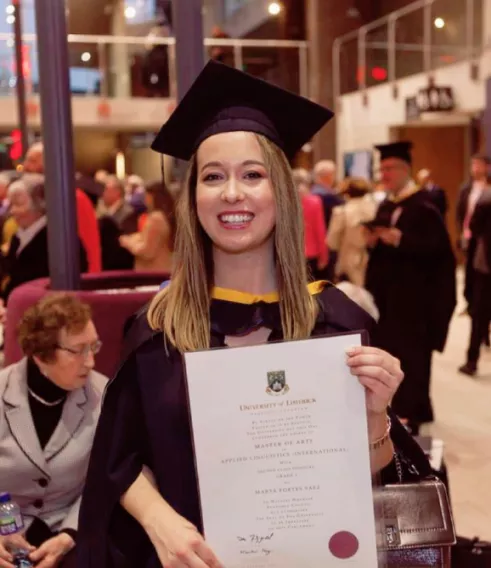
Course Details
Contact(s):
Apply Now
Read instructions on how to apply
Express InterestRegister your interest here for more information or to be notified when applications are open.
Brief Description
The MA is about exploring language in use in a wide variety of real-world situations and contexts (technology, education, institutions, politics, media, the economy and wider society). The MA has a strong international focus both in practical terms with the possibility of an overseas semester or an international internship, and in theoretical terms reflecting faculty research interest in the sociolinguistics of globalisation, multilingualism and contact varieties, and intercultural communication and translation.
The Graduate Diploma/Master of Arts in Applied Linguistics (International) is a one-year taught programme and is offered on a full-time basis using a combination of faculty-student contact hours and self-directed learning and research. Applied linguistics is about studying and understanding language in real world situations and using language to solve problems in society. The programme in UL builds on strengths in specific real- world domains of language, e.g. technology, media, education and pedagogy, language policy, and language for specific purposes, as well as expertise in applied sociolinguistics which helps to understand language in use in different contexts and cultures. Core modules focus on Applied Linguistics, Technology and Research Methodologies in Language Studies, while in elective modules students can choose from a variety of options in domains (e.g. organisations, journalism), applied sociolinguistics (e.g. pragmatics, variationism), intercultural communication (e.g. translation, Irish-German relations), or education / pedagogy (e.g. ). Students also have the option to complete their spring semester at one of our partner universities. The summer semester is focussed on completing either an internship (praxis) or a research dissertation.
| Autumn Semester | Spring Semester | Summer Semester |
Core Modules
Electives - Choose 2 from the following:
| Core Modules
or
Electives - Choose 2 from the following:
| Research Dissertation in the area of or Applied Linguistics (International) Praxis |
Content of modules can be found by using the search option on the book of modules
Key features
- Option to do an international praxis semester (12-week internship or placement) or a traditional dissertation in the summer semester.
- Option to spend the second semester on external academic placement with a partner institution abroad, gaining valuable international experience.
- Advanced proficiency and academic writing modules to enable international students to enhance their English skills.
- Wide range of options to allow students to tailor their choice of electives to particular pathways, e.g. teaching, translation, sociolinguistics, language and organizations.
An undergraduate degree at 2.2 honours level (Level 8 - National Qualifications Authority of Ireland or international equivalent) in an appropriate subject (languages, linguistics, media, communication, English are particularly welcomed, but applications from suitably qualified candidates from other disciplines will also be considered). An interview may form part of the selection process for all applicants. This will be done in person if possible or alternatively via Skype or video conferencing where the candidate is not available and cannot attend an interview.
Candidates who do not meet these criteria may apply for admission to the MA in Applied Linguistics (International) programme as recognised prior learning may be taken into account. The admission of such applicants would be exceptional and would be subject to the approval of the Course Director and the Course Board. Places on the programme will be offered on the basis of the above, viz. qualifications, performance and interview, language proficiency level (if applicable).
WHAT TO INCLUDE WITH YOUR APPLICATION:
- Qualification transcripts and certificates
- A copy of your birth certificate or passport
- A copy of your CV
- A one page supporting statement
- If your qualifications have been obtained in a country where English is an official language this will suffice.
- If this is not available, the following additional documents must be provided:
- English translation of your qualification(s)/transcripts AND
- English language competency certificate
- Please click here for Further Information on English Language Requirements
Guidelines on Completing your Application
- To ensure a speedy assessment of your application, please upload the above documents with your application form – your application cannot be assessed until relevant documentation is uploaded
- Please title appropriately any documents you are uploading with the application form, for example "Supporting Statement", "Undergraduate Transcript", "Postgraduate Transcript", "English Language Certificate" etc.
International students can find more information on eligibility requirements here.
EU - €7,600
Non- EU - €18,000
Once registered, students can apply to pay their fees in instalments. A request for a payment plan should be emailed to student.fees.office@ul.ie.
Further information on fees and payment of fees is available from the Student Fees Office website. All fee related queries should be directed to the Student Fees Office (Phone: +353 61 213 007 or email student.fees.office@ul.ie.)
Career Prospects
Students graduating from this course will be equipped to follow a number of career paths. These include: teaching at various levels (including university), school management, business, publishing, materials’ development, adult education and support, further study to PhD level.
Students pursue careers in the following areas:
- Teaching at various levels
- School management
- Translation
- Business, linguistic consultancy
- Publishing Materials’ development
Graduate Testimonials

Marta Fortes-Saez, MA Applied Linguistics graduate, Class of 2018-19 “If you like languages and you are interested in learning a lot about not only how to teach a language but how language works, how it works in politics, in society, the power of language. It’s just amazing. This MA is open to the importance of language in society, more than I ever could have imagined.”
Graduate and Professional Studies
+353 (0)61 234377
University of Limerick, Limerick, Ireland
Contact Us | Download Prospectus | Sign up to stay informed | Quality and Feedback